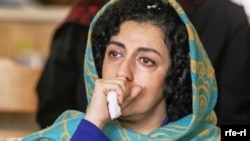Prominent Iranian human rights defender Narges Mohammadi has been sentenced to an additional year in prison by the judiciary.
A post on an Instagram account managed by her close associates says Mohammadi had been found guilty of propaganda against the Islamic Republic system due to her recent statements.
Mohammadi's total sentence now increases to ten years and nine months in prison, in addition to 154 lashes.
The Instagram account says the recent ruling is part of the five pending cases against her in the Evin Security Court and was heard in Branch 29 of the Revolutionary Court, presided over by Judge Mazloom. Mohammadi said that she did not recognize the legitimacy of the Islamic Republic and its show trials and consequently, she refused to participate in the proceedings.
The verdict was communicated to her through a document in the women's ward of Evin Prison, but Mohammadi refused to sign it.
Mohammadi is a 51-year-old human rights activist, who has faced several sentences. In September 2020, she was released after serving five years. In June 2021, she received a new sentence of 80 lashes and 30 months of imprisonment on charges, including "propaganda against the system, prison sit-in, mutiny against prison authorities, breaking glass," and "defamation." Mohammadi openly rejects the trial verdict and has been detained since November 2021.
Over the past year, Mohammadi has consistently raised her voice from within the confines of the prison, protesting many issues. Recently, she wrote a report about the health condition of Zohreh Sayadi, a child labor rights activist, and questioned what she called the ethical background of the judges in the Islamic Republic who commit such crimes against fellow human beings.
Regarding the election of the Islamic Republic's U.N. ambassador to chair the U.N. General Assembly's Social Forum by the Human Rights Council last month— Mohammadi voiced her strong disapproval, saying "The Islamic Republic is destructive to Iranian civil society... It is an oppressive and violent government, one of the most flagrant and blatant human rights violators."
During her speech at the International Alexander Langer Foundation award ceremony in 2009, Mohammadi said that women, as pioneering and advancing forces for change, have faced the wrath and violence of the government. She emphasized that compulsory hijab wearing has been weaponized as a tool of oppression against women by religious authorities.




